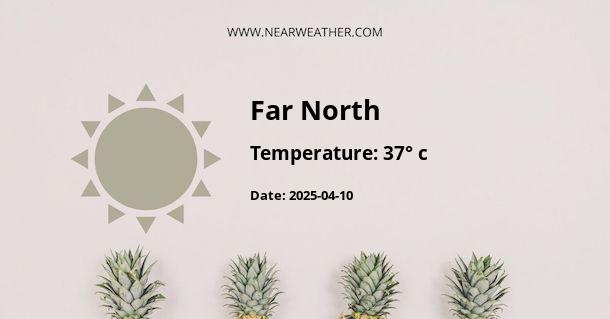Climate and Weather in Far North Region, Cameroon
The Far North Region of Cameroon is located in the northernmost part of the country and is known for its unique climate and weather patterns. This region experiences a combination of desert and tropical climates, making it a fascinating destination for climate enthusiasts and travelers alike.
Temperature
The region experiences high temperatures throughout the year, with average daily temperatures ranging from 25°C (77°F) to 40°C (104°F). The hottest months are typically April and May, when temperatures can soar above 40°C (104°F). The cooler months are from November to February, with average temperatures ranging from 25°C (77°F) to 30°C (86°F).
The temperature variations in the Far North Region are primarily influenced by its proximity to the Sahara Desert and the Sahel region. The desert winds often bring hot and dry air masses to the area, contributing to the high temperatures.
Rainfall
The Far North Region has a distinct dry and wet season. The region receives the majority of its rainfall during the wet season, which typically starts in May and lasts through October. During this period, the region experiences heavy rainfall and occasional thunderstorms.
The average annual rainfall in the Far North Region ranges from 700mm to 1,200mm (27.5 inches to 47.2 inches). The wettest months are July and August, with precipitation levels reaching their peak. However, it's important to note that rainfall patterns can vary from year to year due to climate variability.
Humidity
The Far North Region has relatively low humidity levels throughout the year. The dry and hot desert winds contribute to the low moisture content in the air. Humidity levels typically range from 30% to 50%, with slightly higher levels during the wet season.
Wind
The region experiences strong and gusty winds, particularly during the dry season. The Harmattan wind, originating from the Sahara Desert, blows across the Far North Region, bringing dry and dusty conditions. These winds can occasionally cause sandstorms and reduce visibility.
Climate Zones
The Far North Region can be divided into two distinct climate zones: the Sahelian zone and the Sudano-Sahelian zone.
The Sahelian zone covers the northern part of the region and is characterized by a semi-arid climate. This zone receives less rainfall and has higher temperatures compared to the Sudano-Sahelian zone. Vegetation in this area is sparse, mainly comprising of thorny shrubs and grasses adapted to arid conditions.
The Sudano-Sahelian zone, located in the southern part of the region, has a more tropical climate. It receives higher amounts of rainfall and supports a greater variety of vegetation, including savannah grasslands and scattered trees.
Extreme Weather Events
The Far North Region is prone to occasional extreme weather events, including droughts and floods. The region's proximity to the Sahel region, which experiences frequent droughts, makes it susceptible to dry spells and water scarcity. Conversely, during periods of heavy rainfall, the region can experience flash floods, which can cause damage to infrastructure and agriculture.
Conclusion
The Far North Region of Cameroon experiences a unique combination of desert and tropical climates, resulting in high temperatures, distinct wet and dry seasons, and occasional extreme weather events. Its proximity to the Sahara Desert and the Sahel region contributes to its weather patterns. Travelers visiting this region should be prepared for the hot and dry conditions, as well as the potential for heavy rainfall during the wet season.
A - Far North's Latitude is 11.000000 & Longitude is 14.500000.
A - Weather in Far North is 37° today.
A - Climate Conditions in Far North shows overcast clouds today.
A - Humidity in Far North is 22% today.
A - Wind speed in Far North is 20.27 km/h, flowing at 121° wind direction. today.
